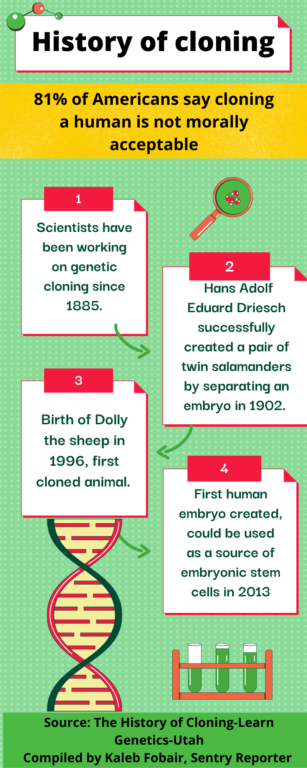By Kaleb Fobair
Reporter

The power of cloning is already out of the box. The further scientists advance in cloning, the closer we get to playing God. That much power can become too dangerous where humans could control life and death.
Plenty of movies tell us that cloning is a bad idea. As Ian Malcom said in the 1993 Sci-Fi classic Jurassic Park, “Your scientists were so preoccupied with whether or not they could, they didn’t stop to think if they should.”
There are cloning farms around the country that clone animals and raise them. Has the line already been crossed or are we just barely touching the line? The power of cloning is already risky and the more we advance in it, the more powerful and dangerous it will become.
Certain notions go against the principles of human dignity, like the idea of cloning humans with desired traits to make humans stronger and smarter. To make perfect human individuals. This goes against equality and human dignity.
“It is considered the manufacture and destruction of a human life,” said Michael Rugnetta in his article titled “Reproductive Cloning.” Since 1885, scientists have been working on genetic cloning.
The first studies on cloning began by Hans Adolf Eduard Driesch, who successfully created a pair of twin salamanders by separating an embryo in 1902. The study and growth of cloning research would eventually lead to the birth of Dolly the lamb, the first animal to be cloned from the cells of an adult animal.
Since the success of Dolly, animal cloning has become a regular thing as many more animal clones have been born. With animal cloning becoming more mainstream, that begs the question.
Should human cloning be considered? Human cloning is illegal in most parts of the world. Currently, human cloning is considered unethical.
As scientists continue to make advancements in the field of cloning, the closer we get to bringing dinosaurs back to life. Consider why they are extinct and how they would function in today’s world. I can tell you we don’t have the slightest idea of what could happen.

Leave a Reply